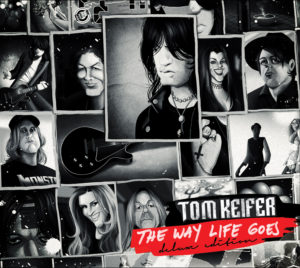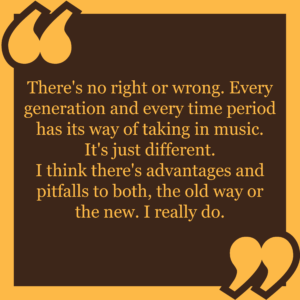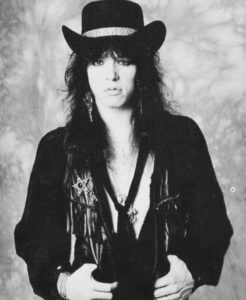 Tom Keifer has been bringing the rock ‘n’ roll thunder to music lovers for over three decades. As the frontman for the bluesy metal band Cinderella, the Pennsylvania native has sold more than 15 million records worldwide and has amassed a loyal fandom that has followed him throughout the ever-changing music industry landscape, from vinyl consumption to cassette tapes, CDs to digital, and back to the nostalgic allure of vinyl once again. As he sang with Cinderella, “The more things change, the more they stay the same.”
Tom Keifer has been bringing the rock ‘n’ roll thunder to music lovers for over three decades. As the frontman for the bluesy metal band Cinderella, the Pennsylvania native has sold more than 15 million records worldwide and has amassed a loyal fandom that has followed him throughout the ever-changing music industry landscape, from vinyl consumption to cassette tapes, CDs to digital, and back to the nostalgic allure of vinyl once again. As he sang with Cinderella, “The more things change, the more they stay the same.”
Currently Keifer is out on the road in support of his recently re-released debut solo album, “The Way Life Goes – Deluxe Edition,” which includes bonus tracks and an exclusive DVD featuring music videos, tour clips, and a 30-minute documentary called “The Way Life’s Goin.”
We recently sat down with Keifer to discuss the album’s journey, traversing the music industry landscape, and how experiencing music has changed from when he started writing and recording to where things are today.
TrunkSpace: Crowds at your shows participate in a continuous singalong. They know your material inside and out. The level of passion for the music is very unique, especially considering how long you have been doing it and how many of them have been on that journey with you the entire time.
Keifer: Playing live has always been my favorite part of what I do. I love writing the songs and creating in the studio, but there’s nothing really like that moment where you set foot on stage and it’s live. It’s no do-overs and you’re in the moment, and it’s just rock ‘n’ roll. What you mentioned about as long as I’ve been doing this, I just feel really fortunate every night when I walk up there to look out and see all those people still singing the songs, not only the Cinderella stuff but the stuff on “The Way Life Goes” too now, which is… I feel like a lucky dude.
TrunkSpace: Is it particularly gratifying that fans have been connecting with the solo stuff?
Keifer: Yeah, that’s amazing. When the record was first released and we started touring with the new band, it was a little bit of an eye opener because you’re really starting over, and I think anyone who leaves a very successful band and goes out on their own probably doesn’t realize that until they step foot into that territory. And then you go, “Oh wow. This is starting over.” (Laughter) But the record did so well on radio, the first single, and the reviews on it were really great, and the fans just really received it well. So that was a great feeling. The touring took a little bit of time to build. We started with very, very small clubs the first year, and we were lucky if we were filling them halfway. But that grew the more we were out there because the band has an amazing chemistry and energy live, so word started to spread. My social media started to grow, which I didn’t have before the record was released. I didn’t even know what social media was. The label set me up with it and said, “Here’s the keys. Go have a good time.” (Laughter)
So you know, a lot of word of mouth happened, and the band really became popular and still is growing on the tour circuit to the point where we went from those small, half-full clubs to now we’re headlining or direct support on all the major festivals. We’re still playing the smaller rooms but selling them out now – we’re filling them up. Like you said, it’s gratifying to be able to watch that grow with something new and particularly with a band where I really, really love, everyone in the band, and our chemistry’s great on and off stage. They’ve been incredibly dedicated to this journey, and it’s been really cool.
TrunkSpace: It seems a lot of fans are sharing your music with their kids as well, which in turn, is making an entirely new generation of rock lovers discover your sound and what you’re all about.
Keifer: I think that the ’80s bands really started to transcend into the next generation even before I released the solo record. We started seeing that on the last handful of tours I did with Cinderella, where there were younger people showing up, and they weren’t necessarily with their parents. Some were, but the older teenagers were just coming on their own. I think YouTube was a huge discovery mechanism. YouTube, and now probably with streaming and all too, it really got people going back and they’re seeing the Moscow Music Peace Festival, or they’re seeing this or that. I think a lot of people got turned on to it through that way and seeing current live performances on there. Also, people put up the music too, just links of the music, so I think the internet has helped spread that, and you see that now with the solo band and the new record too. Same thing.

TrunkSpace: When you first decided to put “The Way Life Goes” together, what made it the right time for you in terms of pursuing solo material and why do you think it took you that long to get there creatively?
Keifer: I started writing stuff for a solo record really in the mid-’90s. I moved to Nashville because I was writing with people here, like in ’97, with the idea of recording a solo record because the whole music scene had changed with the grunge movement coming in and all. I was working on my own stuff, and when I got to Nashville, Cinderella was offered a record deal on Portrait. So the solo project went on the back burner, and we started touring again and writing for a record, and that went on for a couple years and A&R people wearing us out saying, “More songs, do this, stay on the road, blah, blah, blah, blah, blah.” And then eventually, the record never got made and the label went out of business. It was not pretty.
I was on the heels of a bad record deal, one that had gone south, and I was kind of fed up with the industry. At the same time, my wife, Savannah, who’s a singer-songwriter and was actually in Nashville a few years before me even, she had been through some similar stuff with her deals here on Music Row, and we were both in the same place and fed up with dealing with record companies and business stuff. We just started making music just for the fun of it, writing songs and recording songs with musician friends of ours here and session players that Savannah had done a lot of work with. So, we started this journey of work in progress, labor of love, over a course of about nine or 10 years off and on, recording songs and taking long breaks from them and coming back to it. I was still touring with Cinderella at the time and woke up one day and realized that we had a record and very quickly found a label that was over the moon to release it. So that’s the journey of it and how it came about and maybe why it took so long, because I did get sidetracked with that Cinderella deal in ’98, which turned out to be a big bunch of heartache more than anything.
TrunkSpace: Those kinds of heartaches must take their toll on the creative mindset, especially when you put so much into something?
Keifer: The story of that doesn’t end there because the record (“The Way Life Goes”) was released in 2013 and was received really well. The first single did killer, “Solid Ground,” at rock radio, and “The Flower Song” was getting played on Triple A and some alternative stations, and even got a little top 40 action on satellite. And it’s like, “Wow, this thing has taken off and is getting great reviews.” I don’t think I’ve seen a bad review on the record. And the fans loved it. We’re out playing the songs alongside the Cinderella classics live, and they’re going down just as big. But then we had a bit of another business or legal issue after the record was released, where for lack of a better word, we’ll just call it a corporate shake-up or some business dealings that the record got caught in the middle of, and eventually ended up getting pulled from the shelves. It hasn’t been available for the last two years.
TrunkSpace: Right, which is crazy considering how much time and energy you spent on it.
Keifer: We’re out touring with the band, and we’re seeing comments on social media like, “Love the new stuff, but where do you get the record? I can’t find it.” Or even worse, “I bought this record in 2013, and it just disappeared from my iTunes.” So imagine reading that after you spend nine or 10 years on a record. It gets released, it’s starting to blow up, and then boom, this happens. To put it gently, we lawyered up and we got our masters back. We got them back last year, and we decided to do a deluxe or an extended edition of the record before we put it back up on the shelves, which is something that we talked about before this legal mess happened. So that’s what we did. We went in last year and we recorded the bonus tracks that are on the deluxe. While we were in there, Tammy Vega filmed the documentary that’s on the bonus DVD. We had David Calcano redo all the artwork and the art package is amazing. We spent the better part of last year editing and mixing and all that stuff to make it really special. We finally got it released just about a month ago.

TrunkSpace: After going through those business headaches with both your solo project and with Cinderella, do you approach things differently now? Are you looking to steer clear of partnering with labels in the future?
Keifer: It’s just life, and it’s business. It happens. I like having a distributor and a label involved because you can get much more of a reach than just putting it up on your website. I still think it’s an asset if you can get one who believes in it. Honestly, the label who released it the first time, I don’t have any complaints. They did a great job marketing it right out of the box. Business happens, and sometimes the music gets caught in the middle of it. They were big believers and really inspired us and did a great job on the record until that happened. Same thing with Mercury Records with Cinderella. They were responsible for really pushing the band out there and selling millions of records, and then when they were done, they wash their hands of you, and it’s usually not pretty. It’s business, right? What are you going to do? Are you going to cry or bum out? You just move on. That’s what I’ve done every time. I’ve been through it.
We just did a deal with Cleopatra Records for the deluxe. They’re a great label. I’ve actually done some things with them in the past. You go into any business dealing hoping for the best.
TrunkSpace: It just seems like the nature of the music business nowadays is so volatile that the labels don’t necessarily know what the future holds, so they’re hedging their bets as much as possible.
Keifer: That’s true. The kind of things that I’ve been through, it’s not unique to me. I don’t know if you’ve seen the Tom Petty documentary “Runnin’ Down a Dream,” but he talks about going through the same thing. That part where he’s telling the stories about them hiding the masters every night when they were done because of the label… it’s just business. (Laughter) You try not to let it interfere with your creative process. You use the business to get your music heard and out there any way you can, but just know eventually that probably something is going to come down on you. It’s just part of it, man. What you’ve got to do is not give up. We had put so much into “The Way Life Goes” in the initial release. We got a taste of how people reacted to it, so when it did go away, and we did have that problem, we had a choice. We could have just said, “Okay, let it slip between the cracks” or “Let’s fight for it and get the masters back and get it back up there.” We believe in the record, so that’s what we did.
TrunkSpace: There was a time when a tour was meant to support an album, but nowadays, it seems like things have flipped a bit and an album supports a tour. As far as the business side of music is concerned, are tours more important today than they were 20 or 30 years ago?
Keifer: Touring has always been important, number one, because it’s just fun. Playing live is my favorite part of what I do. I think one has always fed the other. It feeds it a little bit differently today than it did back then, but touring was very important to promoting the record back in the ’80s. But the record also promoted the tour back then too. It’s a circle. It’s the same thing now. It’s harder to actually sell records now, so the amount of money that can be generated by a label on album sales, that kind of doesn’t happen the way it used to. If you blow something up the top 40, you still can sell millions of records, but that’s a long shot there, especially these days. I think they both feed each other and they have in both time frames or time periods that you mentioned, just in different ways.
TrunkSpace: Does the return of vinyl, at least for enthusiasts and collectors, help generate more interest in back catalog material? Is that a viable revenue stream?
Keifer: Yeah. People who like physical products still buy physical product. And there’s people who are very dedicated to that, and they want to hold that in their hand, which is one of the reasons we went to great lengths on the deluxe edition to make it really special so when you pick it up and hold it, it has new artwork and a booklet and two discs and the whole nine yards. I think that there are people who, definitely, that’s what they want. Particularly lately, it seems to be vinyl is really making a comeback. So yeah, I think that there’s people who still really like that. I do. It’s cool. I miss the days of when I got the “Physical Graffiti” album and it was the gatefold and all the artwork.
TrunkSpace: There’s something nice about being invested in an album as well and having to physically be a part of it by getting up and flipping the record. You become a part of the experience.
Keifer: And having to get up and go out and get it, like leave your house to get it!
The digital thing, it’s so easy and it’s so convenient to get music now that, and I’m guilty of it, I’m sure you are and I’m sure everyone on the planet is now, but you hear a song or two and it takes a lot longer now to get you to buy the record. You’ve got to hear the record. You keep hearing the same song. I know I keep hearing the same song, and I say, “Oh, I’ve got to get that record.” It might be a year and then I finally get the record. It’s so easy to buy and it just goes into your phone. You almost forget that you have it. It just seems more disposable now. There’s records that I’ve downloaded, and I’m sure you’ve done this too, and then you haven’t even listened to them yet.
TrunkSpace: Guilty as charged.
Keifer: It’s because it’s so easy. It used to be if you wanted the Rolling Stones “It’s Only Rock ‘N’ Roll” when it came out, you had to wait until the release date and you had to get up, you had to go to the store, and you had to buy it. It was this big physical thing that you brought home. You couldn’t listen to it anywhere you wanted to. You had to listen, had to make the time to put it on your turntable. It’s just a different experience, you know? There’s no right or wrong. Every generation and every time period has its way of taking in music. It’s just different. I think there’s advantages and pitfalls to both, the old way or the new. I really do.
“The Way Life Goes – Deluxe Edition” is available now via Cleopatra Records.
The remaining Tom Keifer tour dates can be viewed here.


